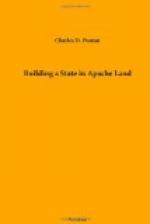One day an orderly from Fort Buchanan rode up to headquarters and handed me a note from Lieutenant Chapin, enclosing a copy of an order from the commanding officer of the Military Department:—
Santa
Fe, June, 1861,
Commanding Officer, Fort Buchanan:—
On receipt of this you will abandon and destroy your Post; burn your Commissary and Quartermasters’ stores, and everything between the Colorado and Rio Grande that will feed an army.
March out with your guns loaded,
and do not
permit any citizen within fifteen miles of your
lines.
(Signed) Major General Lynde
A council of the principal employees was called, and the order laid before them. The wisest said we could not hold the country after the troops abandoned it,—that the Apaches would come down upon us by the hundred, and the Mexicans would cut our throats. It was concluded to reduce the ore we had mined, which was yielding about a thousand dollars a day, pay off the hands, and prepare for the worst.
About a week afterwards the Apaches came down by stealth, and carried off out of the corral one hundred and forty-six horses and mules.
The Apaches are very adroit in stealing stock, and no doubt inherit the skill of many generations in theft. The corrals are generally built of adobe, with a gate or bars at the entrance. It was a customary practice for the Apaches to saw an entrance through an adobe wall with their horsehair ropes (cabrestas).
The corral at Arivaca was constructed of adobes, with a layer of cactus poles (ocquitillo) lengthwise between each layer of adobes. The Apaches tried their rope saw, but the cactus parted the rope. The bars were up, and a log chain wound around each bar and locked to the post; but they removed the bars quietly by wrapping their scrapes around the chain, to prevent the noise alarming the watchman. The steam engine was running day and night, and the watchman had orders to go the rounds of the place every hour during the night; but the Apaches were so skillful and secretive in their movements that not the least intimation of their presence on the place was observed,—not even by the watchdogs, which generally have a keen scent for Indians.
At the break of day the Apaches gave a whoop, and disappeared with the entire herd before the astonished gaze of five watchmen, who were sleeping under a porch within thirty yards. A pursuit was organized as soon as possible; but the pursuers soon ran into an ambuscade prepared by the retreating Apaches, when three were killed and two wounded. The rest returned without recovering any of the stock.
This loss of stock made very lonesome times at Arivaca, as it could not be replaced in the country, and we had no animals to haul ores, fuel, or provisions; only a few riding and ambulance animals, which had to be kept in stables and fed on grain.
About the same time the Apaches made an attack on the Santa Rita Mining Hacienda, and the eastern side of the Santa Cruz River had to be abandoned.




